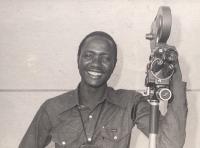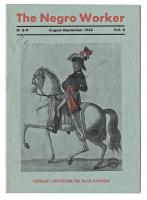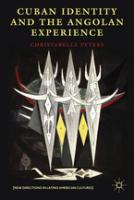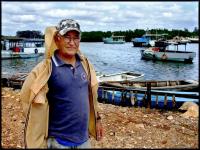Cuba
Articles tagged with Cuba
Tag Archive
- 27 de Maio de 1977
- África do Sul
- african arts and crafts
- Alberto Carneiro
- Alqueva
- Amazónia
- Andanças
- apartheid
- Arte Contemporênea
- artes performativas
- Bienal de Coimbra
- Black body
- Black Lives Matter
- BLM
- Boaventura Sousa Santos
- border
- Brazil
- Bruno Pereira
- Cape Vert
- Carlota de Barros
- cinema africano
- cinema indígena
- contemporary photography
- critica
- Cultural Heritage
- culture programme
- curatoria
- Danças africanas
- decolonisation
- diáspora caboverdiana
- direitos humanos
- economia
- expression
- Felix Shumba
- Fernando Pessoa
- festivity
- For Mozambique
- França
- George Floyd
- guarani-kaiowá
- Guiné Bissau
- gulbenkian
- Hannah Arendt
- imigrantes
- imigration
- immigrant
- institute
- insularity
- intelectualidade brasileira
- iwalewahaus
- Jahmek Contemporary Art
- JSF #2
- korubo
- Krik-krak
- land-ing
- LGBTI
- língua
- London
- Mário Pinto de Andrade
- marxism
- migrations
- Miguel Gomes
- muriqui
- Museu é o mundo
- museum
- museums
- musseque
- new negro
- Ngola Ritmos
- ocupações temporárias
- oppresed
- Oppressions
- PAIGC
- Pé de Xumbo
- periphery
- political protests
- post-colonial contemporary art
- post-coloniality
- post-memory
- postcolonialism
- public space
- queer
- representativity
- resistance
- rijksmuseum
- Roberto Conduru
- sello pesa
- Sexual Misconduct in Academia: Informing an Ethics of Care in the University
- social conventions
- stage
- Statement
- sudoeste
- sul
- Tervuren
- Tourist
- Uanhenga Xito
- Western civilization
- youth
- Yvone Kane
- Zimbabwe
 He tells us about the important and complex mission that Amílcar Cabral delegated to them and what it was like to learn the crushing news of his assassination in the middle of this process. It fell to him as his first job to film Amílcar Cabral at an exhibition on the struggle in Conakry, in 1972, and then the transferring of his body to Bissau, capturing the commotion of the Guineans at the death of their greatest thinker and anti-colonial resistance leader.
He tells us about the important and complex mission that Amílcar Cabral delegated to them and what it was like to learn the crushing news of his assassination in the middle of this process. It fell to him as his first job to film Amílcar Cabral at an exhibition on the struggle in Conakry, in 1972, and then the transferring of his body to Bissau, capturing the commotion of the Guineans at the death of their greatest thinker and anti-colonial resistance leader.  The significance of Mexico for this work is still emerging. Much more remains to be seen about just how deeply embedded the Mexican communists were in the radical networks across the Caribbean where black workers were predominant. Of what I have uncovered, the place of Mexico has two important functions in our historical understanding of the period. First, it was a place of refuge for not only radicals like the forced emigre from Republican Spain, but also for black revolutionaries like Jacques Roumain who spent some time there after being released from prison in Haiti and a short stint in Europe. Second, Mexico was the first people of color Communist nucleus in the western hemisphere, and the sense of anti-imperialism and sensitivity to chauvinism in the CPUSA was critical to strengthening the antiracist struggle across the region.
The significance of Mexico for this work is still emerging. Much more remains to be seen about just how deeply embedded the Mexican communists were in the radical networks across the Caribbean where black workers were predominant. Of what I have uncovered, the place of Mexico has two important functions in our historical understanding of the period. First, it was a place of refuge for not only radicals like the forced emigre from Republican Spain, but also for black revolutionaries like Jacques Roumain who spent some time there after being released from prison in Haiti and a short stint in Europe. Second, Mexico was the first people of color Communist nucleus in the western hemisphere, and the sense of anti-imperialism and sensitivity to chauvinism in the CPUSA was critical to strengthening the antiracist struggle across the region.  November 5, 1975 marked the 132nd year anniversary of the slave rebellion at the Triumvirato sugar plantation in Matanzas province, led by an enslaved African woman named Carlota. As one of the first acts in her liberation campaign, Carlota, accompanied by her captains, made her way to another plantation, Arcana, where a number of co-conspirators were being held in captivity following an uprising there in August of that year’s incendiary summer, when Africans and their descendants rose up against their enslavers throughout the province. As word spread of Carlota’s successes, one estate after another erupted in insurrection—San Miguel, Concepción, San Lorenzo, and San Rafael.
November 5, 1975 marked the 132nd year anniversary of the slave rebellion at the Triumvirato sugar plantation in Matanzas province, led by an enslaved African woman named Carlota. As one of the first acts in her liberation campaign, Carlota, accompanied by her captains, made her way to another plantation, Arcana, where a number of co-conspirators were being held in captivity following an uprising there in August of that year’s incendiary summer, when Africans and their descendants rose up against their enslavers throughout the province. As word spread of Carlota’s successes, one estate after another erupted in insurrection—San Miguel, Concepción, San Lorenzo, and San Rafael.  Carlos is the character I am most worried about. I’d only spent a few hours with him before, and I am not sure what he will reveal about his time in Angola and how that will fit into the film. He is a fisherman, his skin deeply tanned from a lifetime at sea.
Carlos is the character I am most worried about. I’d only spent a few hours with him before, and I am not sure what he will reveal about his time in Angola and how that will fit into the film. He is a fisherman, his skin deeply tanned from a lifetime at sea. 
